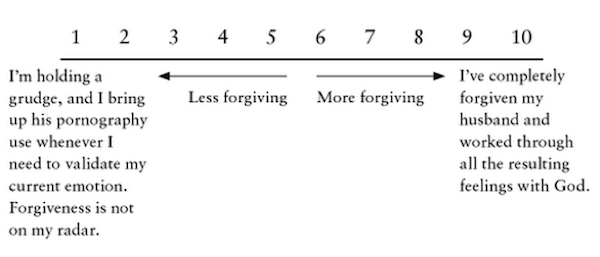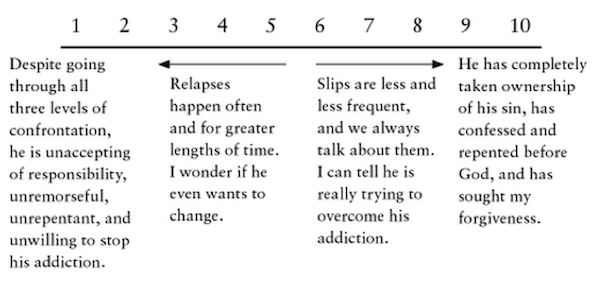Editor’s Note: The views expressed in this post are the author’s, and do reflect an official stance of Covenant Eyes. While recognizing the reality of brokenness caused by pornography, Covenant Eyes celebrates restored relationships whenever possible. We recommend our article 6 Powerful Stories of Marriages that Overcame Porn if you are looking for encouragement!
“I am hurting so much over this…If I believed in divorce I would already have done it, and I am beginning to maybe believe divorce is ok. After all, this seems like a type of adultery to me. Am I wrong?” – Mary Ann
After writing more than 1,200 articles for Covenant Eyes and having replied to too many comments and e-mails to count, undoubtedly the most heart-wrenching stories I hear are from women who are living with a porn-addicted husband.
When a woman has discovered her husband is entrenched in pornography, reactions can vary greatly, but for many women it is nothing short of traumatic. Whether she’s dealing with the initial blow of uncovering a 20-year-long secret addiction, or she’s facing the daily blow of her husband’s coldness, for these women their life feels like a living hell.
In the past, when asked if divorce could ever be a viable option for these women, my typical response has been a reluctant no. As much as my heart went out to these women trapped in horrific marriages, I simply didn’t see any biblical justification for divorce in situations of porn use.
About a year ago I decided I was going to write my Master’s thesis about this topic and had intended to write a robust biblical defense of my position.
I never imaged I would come to the opposite conclusion.
Some Caveats
Before we launch into this issue, let me state a few caveats.
- Divorce is ugly. We must acknowledge, when addressing the subject of grounds for divorce, the situation that even prompts us to ask this question is under divine judgment. It is a question that involves real hearts, real homes, and a real God who really hates divorce. So it is with great sobriety that we take up this study.
- Having grounds for divorce is not the same as actually getting divorced. This article seeks to answer the grounds question as it relates to pornography. But having legitimate grounds for divorce does not necessitate divorce.
- This article is long and heady. This is not a delicate how-to article for couples in crisis. It is a clumsy attempt to summarize a 33,000-word theological Master’s thesis. Reader be warned.
- The opinions expressed here are my own. Divorce is a contentious issue, and I won’t dare to assume a single article forever settles the debates. I only hope it is a significant addition to the discussion.
The Central Text: Matthew 19:9
The locus of the debate about whether pornography use is ground for divorce is Matthew 19:9:
“I say to you: whoever divorces his wife, except for sexual immorality, and marries another, commits adultery.”
Time and space do not permit me to get into every detail of this text, but a few observations are important:
1. This comment comes after a very strong affirmation about the divine intention for marriage. Just a few verses prior, Jesus says, “Have you not read that he who created them from the beginning made them male and female, and said, ‘Therefore a man shall leave his father and his mother and hold fast to his wife, and the two shall become one flesh’?” (Matthew 19:4-5).
Jesus uses a type of exegesis common early rabbinic Judaism called gezerah shavah, where the activity of God in the first text (making us male and female) is inferred in the second text (the two becoming one flesh). Thus, God is one who joins man and woman together in the covenant bond of marriage. God is the one who unites husband and wife in whole-life oneness. Therefore, what God has joined together, man should not separate (v.6). Marriage is meant to be a lifelong, loving covenant bond.
2. Jesus strikes at the Pharisees’ liberal view of marriage by saying all remarriages after invalid divorces are adulterous. In Jesus’ day, the majority position, promoted by Rabbi Hillel, was “any cause” divorce: any kind of indecency—real or imaginary—was grounds for divorce. As such, divorce was actually quite common among the Pharisees. This view is reflected in the Pharisee’s opening question to Jesus: “Is it lawful to divorce one’s wife for any cause?” (19:3, italics added). In other words, they were asking, “Jesus, do you agree with Hillel’s position on divorce?”
Jesus’ answer is ruthlessly conservative: getting remarried to another is adultery after getting an invalid divorce. Jesus uses similar logic in other divorce texts (Matthew 5:32; Mark 10:12; Luke 16:18). Against all the cultural expectations of young men to get married, after hearing Jesus’ brazenly conservative view, even the disciples second-guess whether marriage is worth it (Matthew 19:10). Nonetheless, Jesus is stalwart in his view, assaulting the very attitude behind the Pharisees’ question. Marriage is never to be thought of as a casual union, subject to the cavalier whims of an lordly male. Marriage must be treated with respect and reverence.
3. Jesus nuances His view with an exception clause. Jesus’ conservative approach does not mean all marriages are completely undissolvable. After a marriage is severed, remarriage to another is not adulterous in the case of πορνείᾳ (porneia)—sexual immorality.
The majority Protestant position understands porneia to include any illicit sexual intercourse outside of marriage.*
The critical matter for our consideration is this: Would Jesus include pornography use as a divorcible offense?
Straw-Man Arguments
Generally, when I bump into those who think porn use can be grounds for divorce, I come across three very bad arguments. In the past, the weakness of these arguments kept me firmly convinced that pornography in itself could never be biblical grounds for divorce.
Bad Argument #1: Pornography is detrimental to a marriage, therefore it is grounds for divorce.
I agree pornography can be detrimental to a marriage, but grounds for divorce ought not be determined by how detrimental a sin is.
Some theologians want to stretch the definition of porneia to the breaking point, saying it encompasses all manner of offenses like emotional or physical abuse, blasphemy, or other generally destructive behavior. Quite simply, regardless of what we say about these terrible offenses, there’s nothing about the term porneia that suggests these meanings. Jesus was thinking of sexual sins specifically.
Bad Argument #2: Porn = Lust = Adultery = Grounds for Divorce
Viewing porn generally involves lust. In the Sermon on the Mount, Jesus said the man who looks at a woman lustfully commits adultery with her in his heart (Matthew 5:28). Jesus also said adultery is grounds for divorce—if we take porneia to mean adultery (Matthew 5:32; 19:9). Therefore, it is argued, viewing porn must be grounds for divorce.
There are a couple major problems with this argument. First, it misapplies Jesus’ own words. The intention of Jesus’ teachings in the Sermon on the Mount is to help His disciples understand the heart of the Law (Matthew 5:17). For instance, Jesus said to be innocent of murder is not enough; anger is also sinful and worthy judgment before the court and ultimately hellfire (v.21-22). It would be wrong to take Jesus’ hyperbolic comments about punishing anger and suggest we set up a formal tribunal to dish out penalties to those who speak harsh words to others. Similarly, to suggest spouses have grounds for divorce for moments of lust goes far beyond Jesus’ intention.
Second, to suggest instances of lust provide grounds for divorce is to give nearly any spouse in the world grounds for divorce. This liberalizes Jesus’ position so much it makes Him worse than the Pharisees he was rebuking.
Bad Argument #3: Pornography Comes from the Word Porneia
Some use a linguistic argument showing porneia’s relationship to the modern term “pornography.” The term “pornography,” meaning “writings of/about prostitutes,” stems from the Greek porn– word group.
However, this is an exegetical fallacy. To interpret a Greek term by how that term has impacted modern languages leads to illegitimate conclusions. For instance, when the Bible says, “God loves a cheerful giver” (2 Corinthians 9:8), it uses the term ἱλαρός (hilaros) from which we get the English word “hilarious.” If we tried to use a modern definition of “hilarious” to help us define the meaning of the original Greek term, we would come to erroneous conclusions. This makes a mistake of chronology: the Greek authors of the New Testament are not responsible for the development of another language hundreds of years after they wrote their materials.
Doubt Sets In
In the past when I’ve commented on the subject of porn and divorce, my motivation has been to defend Jesus’ conservative view of marriage against the encroachments of liberalism—all the while, trying to show immense compassion for the person whose spouse is deeply mired in pornography.
I reasoned, “Sure, in instances where porn addiction escalates to physical adultery or when an unbelieving spouse is so mired in porn they utterly abandon the marriage, we can talk about the possibility of divorce. But porn use in an of itself is not a legitimate grounds for divorce.”
Generally, the question tends to be phrased this way: “Can pornography use ever be considered adultery?” If it can, some reason, it could be grounds for divorce. Of course, answers to that question will vary depending on who you talk to.
But I now believe we come to misinformed stances on this issue because we’re simply asking the wrong question.
A couple years ago I watched a short video interview with Pastor Douglas Wilson where he addresses this very question. Wilson’s point is that when Jesus uses the term porneia in Matthew 19:9, it is a broad term for “sexual uncleanness,” including adultery but not limited to adultery.
Not too long after this I read these words by Pastor John MacArthur in his book The Divorce Dilemma: God’s Last Word on Lasting Commitment:
In the Greek text, Jesus employs the word porneia, which is capable of a broad range of meanings. It is a general term for fornication (illicit sexual intercourse), but can also apply to various kinds of lascivious or immoral behavior, ranging from a moral flaw in one’s character (such as an obsessive addiction to pornography) to the act of bestiality—or even worse. It’s not the specific Greek word for adultery, which would be moicheia—but certainly includes adultery. (The Divorce Dilemma, p.23-24)
Here were two conservative theologians saying essentially the same thing: Jesus didn’t say “except for adultery”; He said “except for porneia,” which is a broader term.
I knew further investigation was warranted, so I set out to find answers.
So, What Does Porneia Mean?
Often, lexicons will define porneia as illicit or unsanctioned sexual intercourse or any sexual activity outside of marriage. The word can also have a nuanced meaning determined by context—such as a specific kind of sexual sin like incest or prostitution.
A widespread Protestant position on Matthew 19:9 is that Jesus is speaking primarily of adultery, and there’s good reason to think this. Nearly any kind of porneia you can name, when committed by a married person, is adulterous in effect. Adultery was the commonly assumed ground for divorce in the Near East in Jesus’ day, so undoubtedly, this was the primary manifestation of porneia that would have come to mind for Jesus’ listeners.
But there are many reasons to believe porneia is not merely a synonym for adultery—even though the terms are closely linked.
- Porneia and adultery are often paired as separate sins in the New Testament (Matthew 15:19; Mark 7:22; 1 Corinthians 6:9; Hebrews 13:4).
- In the New Testament, the term porneia sometimes implies not just isolated acts of sexual immorality but habitual immorality and an attitude of lasciviousness (Romans 1:29; Galatians 5:19; Colossians 3:5; Revelation 2:21).
- Other works of Greek literature show porneia is not synonymous with adultery, but is rather the disposition and behavior that leads to adultery (Sirach 23:23; Herm. 1:3-8).
- Sometimes the word is used to describe an attitude and motivation of lust and objectification (Tobit 8:7).
In other words, porneia focuses on the violating attitude and act, where as adultery focuses on a common effect of this act.
With this broader meaning in mind, it is best to not translate porniea as “adultery” (The Message) or “fornication” (KJV, ASV). The terms “unfaithfulness” (NLT, Phillips) or “sexual unfaithfulness” (CEB) could also lead be misleading. Rather “sexual immorality” (ESV, HCSB, NIV, NKJV) or “unchastity” (NRSV) are closer to the actual meaning.
Prostitution in Rome in the Days of Christ
The word porneia is also undeniably linked to the concept of prostitution. In Greek culture, the complexes where prostitution took place were called porneia. It was also a term of derision: people who held licentious parties in their homes were said to turn their houses into porneia. Thus, if we’re going to understand what the term porneia means, we need to understand the profession of prostitution as it was practiced in Jesus’ day.
Prostitution was practiced all throughout the Mediterranean region, including Israel, Egypt, Chaldea, Phoenicia, Syria—and especially Greece and later Rome. In the sixth century B.C., the statesman Salon of Athens was not only the “father of democracy,” he was also the father of state-sponsored sex slavery, establishing houses of prostitution in Athens and filling them with female slaves. Brothels were found throughout Athens, especially near the marketplace and in front of the citadel. Throughout Greece, it was generally accepted that young men and even married men would frequent prostitutes.
Rome essentially followed much of the Athenian model and developed laws to regulate prostitution. The first time Roman administrators established a full registry of Rome’s brothels there were 64 official bordellos containing 35,000 women and 2,000 men. Prostitution in Rome complimented the mixed sexual morals of the culture.
But the sex industry also had a vibrant and visible entertainment wing. In a class of their own were the prostitutes that engaged in formal entertainment: the aulētris (flute player), the psaltria (singer), and the orchēstris (dancer). These entertainers had a generally low sexual and social status, though highly talented entertainers were counted among the upper-class courtesans. These entertainers were common at Athenian banquets and private parties. Ionian and Phrygian woman were widely know and at times well paid for their skills: a performance of flute playing, zither playing, or drumming combined with erotic dancing that amounted to a striptease. Often they had other skills such as juggling, fencing, and acrobatics.
While these entertainers also worked the streets, they frequented Greek symposia (parties for socializing, drinking, intellectual discussion, and entertainment).There are numerous references to erotic dancers in comedic and sympotic literature. The comic playwright Aristophanes called these women “dancing pornai.”
Pornography as the Entertainment Wing of Prostitution
While the erotic dancers, singers, and flute players of ancient Rome were specialized entertainers in their own right, they were, at the heart of their profession, slave-prostitutes. Their erotic performances at banquets and symposia were a manifestation of their trade—the sale of their bodies for the pleasure of freemen.
The parallels between the modern porn industry and the symposia entertainers of Rome show us that the term porneia was not limited merely to behaviors involving sexual intercourse, but all kind of licentious behaviors, embracing both activity and attitude.
- First and foremost is the nature of their professions: the sale of their bodies for sex and their roles as “entertainers” for the lusts and enjoyment of men. For the orchēstris of Rome, the open door symposia was their stage. For prostituted women today, their stage is millions of publicly accessible websites. Thanks to webcam technology, for instance, there is virtually no line between “interactive pornography” and virtual prostitution.
- Like the brothels of ancient Athens and Rome, women in porn industry today are subjected to the same kinds of terrible conditions in their line of work: body-punishing sex, STDs, as well as a toxic and abusive environment.
- Like many of the lowest class of slave-prostitutes in ancient Rome, many of those featured in porn films today are indeed trafficked women and children. Others are in positions of economic desperation—they “consent” to a life of prostitution, but only in the most demented sense of the word.
- Like the few select aulētrides of ancient Rome who climbed ladder of success to be counted among the wealthy and elite, the porn industry too has its superstars. Big money-makers branch out beyond their personal appearances in porn films to build a brand around their name, and like the prostitute-entertainers of old, gain a measure of freedom and wealth.
- Like the socially respectable symposia of ancient Rome, the pornography industry in Western culture has become mainstream. With the proliferation of porn, in many circles casual or even routine engagement with porn is seen as normal and healthy. In addition, mainstream movies, television, theater, music, and advertising have become porn-like—what Brian McNair calls “the pornographication of the mainstream.”
The pornography industry is the entertainment wing of prostitution, just as the dancing girls of the brothels (the porneia) in the Roman Empire were the sources of entertainment for Roman nobility.
An analogy might bring some clarity to the question. At what point in the following series of scenarios does someone cease to be guilty of porneia?
- Scenario #1: A man openly, habitually, and unrepentantly frequents prostitutes to have sex with them (clearly porneia).
- Scenario #2: A man openly, habitually, and unrepentantly visits homes where prostitution is taking place, but instead of having sex with them, he immerses himself in the sex-saturated environment, watching the orgies, so he can masturbate in front of them.
- Scenario #3: A man openly, habitually, and unrepentantly connects to prostitutes online to watch live-stream videos of them having sex with others while he masturbates.
- Scenario #4: A man openly, habitually, and unrepentantly watches recorded videos of prostitutes having sex with others while he masturbates.
- Scenario #5: A man openly, habitually, and unrepentantly watches the same videos as scenario #4, but the women don’t call themselves prostitutes. They call themselves “porn stars.”
Drawing a hard line is no easy task. The change of physical proximity, timing, or labeling of the participants does not change the fact that in each scenario the man is seeking the services of prostituted women to immerse himself in a world of licentiousness.
Jeremiah 3-4: The Key to Application
In my studies about this issue, the million dollar question I kept asking is this: How does a person differentiate between the everyday lusts of the heart and the kind of porneia Jesus says is a divorcible offense?
The answer is found in the rest of Jesus’ comments to the Pharisees.
After stating his position on the matter, the Pharisees ask Jesus, “Why then did Moses command one to give a certificate of divorce and to send her away?” (Matthew 19:7). The background to their question is the first century debate about Moses’ divorce legislation in Deuteronomy 24:1-4. If Moses permitted divorce, how does this square with Jesus’ very conservative position?
Jesus replies with this statement: “Because of your hardness of heart Moses allowed you to divorce your wives, but from the beginning it was not so” (Matthew 19:8). God permitted divorce under Moses, and still permits divorce, as a concession for the victims of partners with hard and stubborn hearts.
Behind Jesus’ answer is Jeremiah 3-4, God’s dire warning to Judah that judgment is coming unless she repents of her unfaithfulness. As her covenant husband (Isaiah 54:5; Jeremiah 2:2; Ezekiel 16:8-14), God wants to shower blessings on her, but she is rebellious, prostituting herself before other gods. He threatens to divorce Judah just as He did Israel.
That this is the text in Jesus’ mind is evidenced by three major observations:
- Jeremiah is clearly alluding to Moses’ divorce legislation from Deuteronomy 24 in his prophecy (Jeremiah 3:1,8). In fact, it is the one indisputable text in the whole Old Testament that makes reference to Moses’ divorce law, so it makes perfect sense why Jesus would appeal to it in light of the Pharisee’s question.
- In the Greek translation of this text (the LXX), the term porneia is used to describe Israel’s sin. “Because she took her whoredom [porniea] lightly, she polluted the land, committing adultery with stone and tree” (3:9). Repeatedly, Judah’s sin is likened to prostitution (3:1-2, 6-10, 13), a sin for which God sent Israel away with a decree of divorce (3:8).
- In the Greek translation of this text, the term “hardness of heart” (σκληροκαρδίαν) is used (4:4)—the same term Jesus uses to describe the reason why divorce is permissible in certain instances. Judah was not merely playing the whore. She treated her prostitution lightly (3:9). Judah refused to be ashamed of her sin (3:3). She was rebellious (3:13). Her seeming repentance was nothing but pretense (3:10). In a word, Judah was hardhearted in her unfaithfulness.
In other words, if divorces must happen at all, they should happen according to pattern given to us by God Himself. God divorced Israel because of her porneia and hardness of heart, which amounted to more than just adultery—it was unrepentant rebellion.
On this basis, some Christian denominations have recognized Jesus did not mean that single acts of sexual thoughtlessness are grounds for divorce—not even in case of a physical affair—but rather Jesus was talking about persistent, unrepentant sexual sin.
The same is true of pornography use. Alone, instances of using pornography or even a habit of looking at porn are not the only factors to consider. Rather, it is critical to assess hardness of heart.
Thus, we should not think of grounds for divorce as a solid line one crosses but rather a continuum of heart-hardening sexual rebellion. God did not divorce Israel after a single instance of spiritual adultery—had He done that, He could have divorced her at Mt. Sinai, or in the wilderness, or during the reign of the judges, or during Solomon’s reign. God was patient, but eventually He wrote Israel a bill of divorce and sent her away into exile because of her callousness.
Porn and Hardness of Heart: Practicing Discernment
Even if we’re convinced pornography use can be a manifestation of hardhearted sexual rebellion, how do we assess the state of someone’s heart?
The words of Jesus in Matthew 18:15-17 are particularly helpful in this regard. Here Jesus offers for His followers a model of confrontation in cases of persistent sin.
If your brother sins against you, go and tell him his fault, between you and him alone. If he listens to you, you have gained your brother. But if he does not listen, take one or two others along with you, that every charge may be established by the evidence of two or three witnesses. If he refuses to listen to them, tell it to the church. And if he refuses to listen even to the church, let him be to you as a Gentile and a tax collector.
Jesus presents a three-tiered approach:
- In cases of pornography use, assuming the offending partner has not brought the offense to light of his own accord, the first people to discover the offense are often those closest to the situation. This can be spouse, a child, or even an employer. Regardless of the circumstances of the discovery, an individual Christian should approach the offending spouse to discuss the nature of his fault. This should be done with a motivation of restoration: “If he listens to you, you have gained your brother.”
- If this confrontation is not followed by a process of clear repentance and reconciliation, “one or two others” should then become involved. These two or three individuals—ideally those who are spiritually mature and objective—can lovingly confront the offender and, if necessary, provide witness to the confrontation should the case be brought to the church as a whole later on.
- If this conversation or series of conversations are met with a refusal to listen, the church should be made aware of the sin. How one should “tell it to the church,” of course, involves discernment and will depend somewhat on how the church is governed. In this third stage, the goal is still restoration, not unnecessary humiliation.
If this final confrontation is met with stubborn refusal to listen, the result should be excommunication: “let him be to you as a Gentile and a tax collector,” that is, as an outsider and unrepentant sinner. And yet even this should be done in a spirit that aims at the sinner’s eventual repentance (1 Corinthians 5:5; 2 Thessalonians 3:14-15).
As for the offended spouse, this process of church discipline should serve as a divinely given means to both expose hardness of heart as well as push the erring person in one direction or another.
Vicki Tiede, in her book When Your Husband is Addicted to Pornography, advocates for women to go through these three levels of confrontation prescribed in Matthew 18:15-17. Tiede includes a couple helpful diagrams for wives to consider so they can discern the Lord’s will in their situation. First, she asks women to consider their own hearts: on a scale of 1 to 10, how forgiving they have been with their husbands?

Next, she asks women to examine their husbands’ hearts, evidenced by their behavior: on a scale of 1 to 10, how repentant have their husbands been as they have been confronted by the church?

Tiede writes, “Divorce enters the picture if heart is operating near the high end of the scale, with continuous movement towards ten, while your husband’s heart is operating very near the low end of the scale” (p.246).
Once the third and final level of confrontation is reached, Vicki Tiede recommends a time of mediated separation for the couple in order to “create the crisis necessary for him to seek help and finally work toward restoration,” with the goal still being the restoration of the marriage. She writes:
“Think of it this way: the greatest gift you can give your husband is to love God more than you love your husband. God can redeem your husband; you cannot. Thus you love him more by loving in light of his need to repent” (p.244).
It is important churches and spouses avoid unnecessary extremes when it comes to church discipline. On one hand, it is best to keep the number of people involved deliberately small. The tenor behind Jesus’ words is to keep the matter as narrow as possible when it comes to involving others in the communication. On the other hand, church members should avoid making promises of “confidentiality” in the strict sense of the word. To promise not to gossip or slander is biblical, but to promise confidentiality only closes the door to future biblical discipline.
Churches should not rush the process. Each stage of communication might take several meetings, especially if there are at least hints of cooperation from the offending spouse. Plus, only time will tell just how much the erring spouse has truly listened at any stage. The goal is not only the promise to stop the pornographic behavior, but the rebuilding of trust and intimacy in the marriage through changed behavior. Tiede comments:
“You will choose to trust your husband when you are ready. Don’t worry—trusting and forgiving are not the same thing. Rebuilding trust will probably take much longer than it will take to forgive. You will know it’s time to trust when your heart helps you to choose to believe that he will make the right choices. His behaviors will become your trust barometer” (p.89).
Conclusion
In my opinion, pornography use, when it is hardhearted and unrepentant, can certainly qualify as porneia and therefore grounds for divorce.
The Westminster Confession of Faith wisely urges, in the unfortunate and hopefully rare cases where divorce is being considered, that “a public and orderly course of proceeding is to be observed; and the persons concerned in it not left to their own wills and discretion, in their own case.” As in many highly emotional and life-altering situations, when divorce is being considered, God does not want couples to be left on their own to discern His will and wisdom in the matter.
As the church we have a high calling to stand with couples in crisis and point them to the One whose love for His bride knows no end, whose justice is perfect, and whose grace increases more than all the infidelities in the world.
* For the sake of simplicity and brevity, in this article we do not address some of the other views of how porneia should be translated in this text, such as an unlawful or illicit marriage or as premarital sex before or during betrothal. These views have been championed by many intelligent Catholic and Protestant commentators, and they are dealt with at length in my thesis.










Brother, I cannot express how much this article has helped me. I’m currently being examined as a potential future elder, and a sticking point has been my ultra conservative view on divorce (only abandonment of unbeliever). This has helped open my eyes to how the word pornea can be best defined and constrained in its context without opening up the flood gates and allowing divorce for any form of sexual immorality. The exception clause in Matthew 19:9 makes far more sense to me now!
I’m going to try find your thesis for a more in depth study. You’ve given me a lot to chew on!
Blessings!
My ex-wife left me this April because of my porn addiction. I repented. I pleaded for forgiveness. I installed software on all our devices so she would be notified of a relapse. I was abstinent from porn for a full 8 months with no relapses after the initial discussion. She told me trust was being rebuilt. She told me she forgave and believed in me. After 8 months of me fighting to win back her trust, fighting to win back her heart, and being under the impression i had, she left me anyway.
She lied about her forgiveness. She said im an adulterer, and always would be. No discussion, no apology for her lies, no mention of her broken-heartedness in that 8 month period, No further chance of redemption. She just walked out the door, and threw 8 years of love and dedication away.
I am still utterly devastated that my repentance meant nothing to her. Its almost killed me.
Hello, I’m sorry to hear about your painful situation. Praying for God’s peace and comfort in the midst of these trials.
-Keith
Maybe she did not lie about her forgiveness sometimes the damage is permanent. I see nowhere in scripture that a spouse is obligated to reconcile after the marriage vows have been broken. It’s totally her decision to reconcile or not. One can forgive someone without going back to a former state. Some things cannot be fixed. You can’t unscramble an egg. If the love and trust has been destroyed it’s usually permanent.
If I may, I share here an article I wrote about “Marriage, divorce and remarriage”, with the aim of recovering the biblical principles and guidelines in relation to each of these themes, in addition to what tradition has been building over the years: https://vidaemabundancia.blogspot.com/2024/11/casamento-divorcio-e-novo-casamento.html (The article is in portuguese, but you may activate the automatic translation at the right top menu.)
THank you for posting this article. You have moved past the sterile philosophical debate to the backgrounds to find out that this is a serious issue. Let me please add that I do wonder why there isn’t a fuller discussion on what this modern porn addiction lifestyle looks like in a family situation. (surely we realize that in a home exists more than just the husband and wife?) A wife has someone playing this imagery while children are in the home, when teenagers are in the home. What does this do to them? Let us not minimize this evil. For the child is somewhat like living in a prostitute house. I’m sorry to say but not only is it an embarassment to the wife, but it is a form of s@xual abuse against her and can also be against the children. When did we become so hardened to what evil looks like? I grew up in a house like that and outcomes would have been better for the children if they were pulled out of that environment, ie separation of parents. A generation later and still impacts are felt, because the church does not take a moral stand on it. No wonder there is so much rampant immorality today, children grew up in these unholy environments.
Did God tell Adam and Eve that they would die if they even thought about the forbidden fruit?
Once you masterbate the thinking is over and the acting begins.